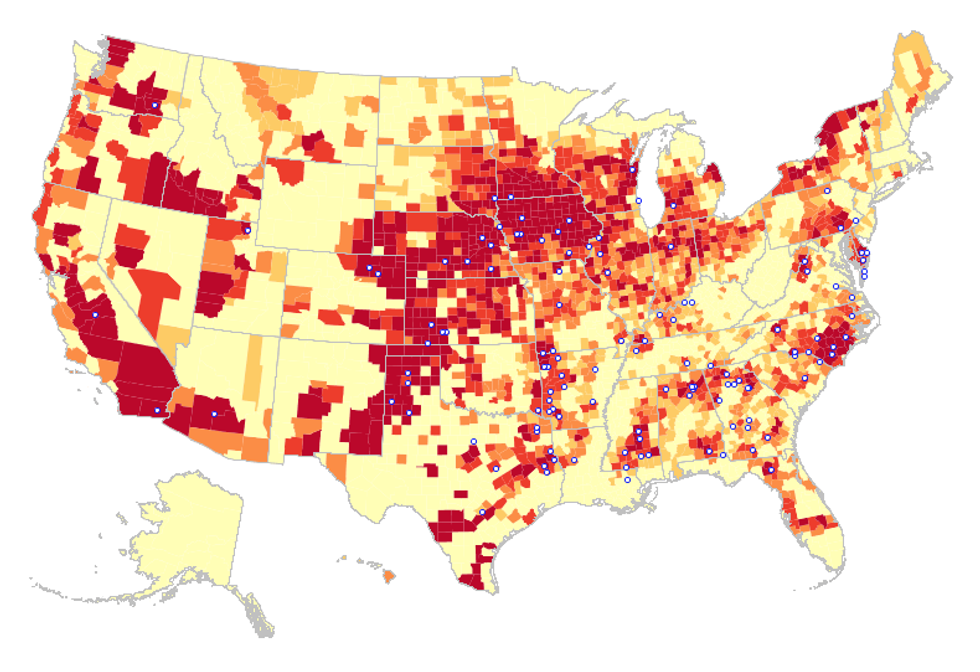More than 50 groups are demanding that Iowa lawmakers urgently pass landmark legislation to enact a moratorium on factory farm expansion in a state that is home to more than 10,000 of them.
"A stop to the expansion of factory farming needs to happen now. It begins with Iowa."
--Krissy Kasserman,
Food & Water Watch
"Across the nation, factory farming destroys communities and contaminates drinking water supplies and air quality," declared Krissy Kasserman, the national factory farm campaigner at Food & Water Watch, one of the groups behind the effort. "A stop to the expansion of factory farming needs to happen now. It begins with Iowa."
In a letter (pdf) to members of Iowa's General Assembly on Thursday, dozens of local, state, and national groups wrote that a ban on new and expanded factory farms would give lawmakers "an overdue opportunity to evaluate the public health, economic, and societal impacts of factory farms while providing Iowa's communities with important statutory protections from further expansion of this industry."
"Iowa is in the midst of a serious water pollution crisis," the letter declares, citing research from 2014 that found 750 bodies of water in the state, or more than half tested, contained pollutants or showed other conditions tied to factory farming, "including E. coli, excessive algal growth, and diminished aquatic life."
The letter chastises the Environmental Protection Agency and state officials who, for decades, "have failed to regulate the environmental impacts of factory farms," and illustrates how existing regulations are "failing Iowa's communities" with a series of examples:
Family farmers and rural residents are often left feeling like prisoners in their own homes, unable to hold family gatherings or hang laundry outside to dry due to the overwhelming stench and air pollution. Retirees are left with the realization that their homes and properties--often their nest eggs--are depreciated due to the decline in property values associated with living next to a factory farm. Research has shown that Iowans living near factory farms are more likely to experience respiratory problems, headaches, diarrhea, burning eyes, nausea, and more serious health problems as a result of factory farm air pollution.
Cherie Mortice, board president of Iowa Citizens for Community Improvement, said even though "state agencies and lawmakers are failing to protect our communities and environment," it is "clear to Iowans that the factory farm industry is out of control." She noted that the state is "seeing a massive expansion" in factory farming, and warned: "we're at a tipping point and need to put a stop to this industry immediately."
Food & Water Watch maps out where factory farms are most concentrated in the country:
In an editorial exploring multiple policy proposals, including a moratorium, the Des Moines Registerwrote last fall that "pressing pause may be the only way Iowa can catch up to this fast-growing industry." The newspaper pointed to a U.S. Department of Agriculture report that showed a "record number of hogs and pigs were on Iowa farms as of Sept. 1: 22.9 million, up 3 percent from a year ago," and noted, "That's about 7.3 times more pigs than people in the state."
"Our call for a moratorium is a call for the return of plain, old common sense," explained Chris Peterson, an independent Iowa hog farmer and regional representative for the Socially Responsible Agricultural Project, another signatory on the letter. "Iowa is suffering under the enormous weight of a business that has no respect for the people, environment, animals and future of the state."


